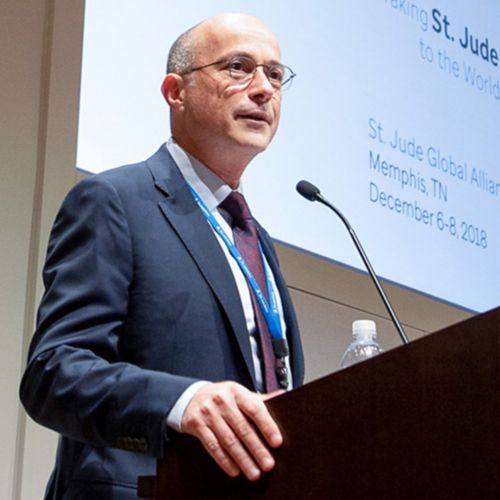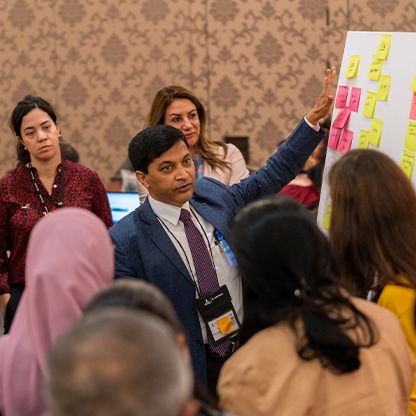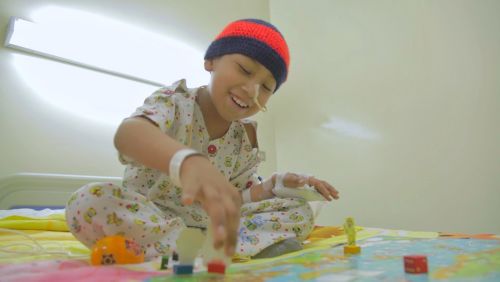Global Scholars: Dr. Venkatraman Radhakrishnan
Deciding to become a doctor was not easy for Dr. Venkatraman Radhakrishnan. In high school he was selected to attend the National Defense Academy in India. The military was familiar to him because his father was a naval officer and, as a child, Radhakrishnan moved from base to base.
But he wanted to do something different with his life: go into medicine. “Once I joined medical school, I was fascinated by the way things worked inside the human body,” says Radhakrishnan. “Learning physiology and anatomy was like reading a novel. The knowledge kept coming, and I was very intrigued.”
While he felt an immediate connection to medicine, going into pediatrics was unplanned. He intended to practice internal medicine for adults but missed out on that residency by one seat.
That is when he began to fall in love with the challenge of treating young kids who can’t really tell you what’s wrong, and the opportunity to help families in need. He was particularly moved by his patient’s parents.
“For a parent, their child means the world to them, and their whole life is shattered by their child’s illness,” he says. “You’re there as a doctor [with] immense responsibilities on you. And they have full faith and trust in you.”
That challenge can be even greater in low- and middle-income countries such as India, where Radhakrishnan works. He is a professor in medical and pediatric oncology at the Cancer Institute in Chennai. He oversees the pediatric oncology division, which treats about 300 new pediatric patients each year.

“For a parent, their child means the world to them, and their whole life is shattered by their child’s illness. You’re there as a doctor [with] immense responsibilities on you. And they have full faith and trust in you.” -- Dr. Venkatraman Radhakrishnan
Throughout Radhakrishnan’s career, he has worked to research, identify and adapt health care solutions that can have an impact on the ground in India. He is sensitive to the fact that what works in one country may not work in another. But he believes that low- and middle-income countries can establish collaborative research groups and conduct clinical trials that address local challenges. This approach was informed in part by his fellowship in the United Kingdom and the circumstances he observed when he returned home.
“I got to see the best of the Western world and what was available,” he says. “But how much of my residency can really be translated back home?”
Without local data, it is hard to determine what is going to work in a place such as India.
“So that’s when I decided that you have to ask questions which are applicable here,” he says. “You have to identify your local problems, what your patients need and then design solutions which are cost-effective and can make an improvement.”
Case in point: As Radhakrishnan started his oncology practice, he observed that almost half of the children he saw were malnourished. The survival rate for malnourished children was about 15% to 20% less than for those with proper nutrition.
Radhakrishnan and his team dug into the issue. They secured donors. They established a nutrition program in the hospital. They hired a nutritionist. They offered cooking tips. And they provided food, not just for the patients, but for their families. These meals were not just available in the hospital, but also to take home. The program reduced the percentage of patients who were malnourished from 40% to just 10% by the time the children had completed their treatment.
“Just by a nutrition intervention, providing an extra glass of milk, more eggs, more rice, you can improve the outcomes in children across the country,” he says. “All it required was to put food on the plate of the family.”
The success of this program ignited a desire to gain new sets of tools and address challenges beyond the walls of his hospital. That desire is what drew him to the Global Scholars Program.
Radhakrishnan’s Global Scholars Project is to establish the first dedicated population-based cancer registry in India. Capturing an accurate picture of pediatric cancer in India is a critical step. A registry is the gold standard for knowing what is happening on the ground. He hopes that the project will establish a model that other hospitals in the country can replicate.
“I think the biggest takeaway [from the Global Scholars Program] would be nine great friends, from across the world,” he says. “They’re an amazing set of people. Whenever I need them, they’re just a WhatsApp chat or phone call away.
“We’re all similar — the way we think and our goals, our ambitions. Together, I think we can make great, great changes.”


